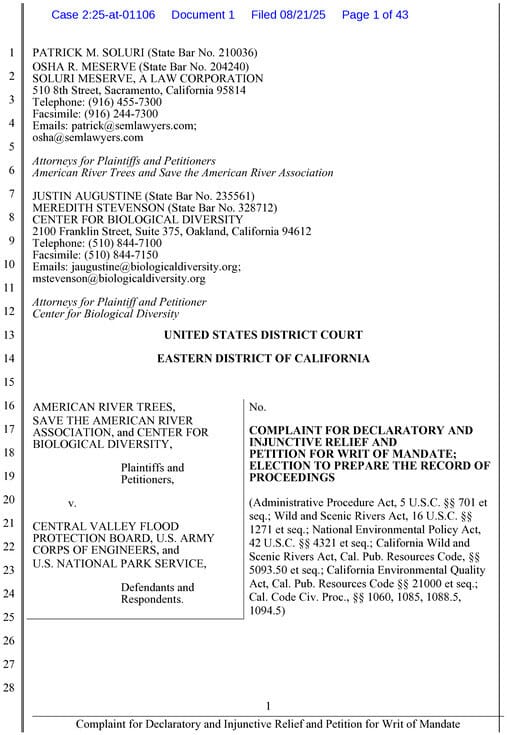Federal Court Issues Injunction Blocking Army Corps of Engineers' Removal of American River Trees
The injunction by the U.S. District Court was issued in response to a lawsuit filed by the Center for Biological Diversity, Save the American River Association, and American River Trees.

A Sacramento federal judge has issued an injunction blocking the U.S. Army Corps of Engineers from cutting down more than 700 trees, including some heritage oaks, along the Lower American River.
The injunction by the U.S. District Court was issued in response to a lawsuit filed by the Center for Biological Diversity, Save the American River Association and American River Trees.
The area slated for tree removal by the Army Corps for “flood control” features 3.3 miles of riparian forest around Howe and Watt avenues in the heart of the Sacramento Metropolitan Region.
“I’m grateful this injunction will keep the forest of the Lower American River intact and healthy,” said Justin Augustine, a senior attorney at the Center for Biological Diversity, in a statement. “The court ruled correctly that the Army Corps must look at options to prevent erosion without sacrificing the forest's heritage oaks that are so important to both Sacramento's wildlife and people. Our hope is that this ruling pushes the Corps towards a more holistic approach that protects these irreplaceable natural areas instead of cutting them down.”
The project sought to address erosion by cutting down forest along the river’s banks and replacing it with giant, boulder-sized rocks known as rip-rap, Augustine noted. The court found that the Corps had promised to analyze an alternative that would prevent erosion while leaving the forest intact but failed to do so.
“Located along the Lower American River between the Howe Avenue Bridge and Larchmont Park, the forest is one of the most popular recreational areas in the Sacramento region for hiking, biking, running, fishing and swimming. Despite being close to an urban center, the forest also supports abundant wildlife, including bobcats, otters, deer, rare turtles, endangered salmon, and numerous species of birds,” the Center stated.
The river parkway is protected under both federal and state Wild and Scenic River Acts. “These acts are designed to preserve designated rivers and their surrounding forests so that they can be enjoyed in perpetuity,” the Center said.
Judge Dena Coggins, in her decision issued Nov. 20, said the “public interest in preserving the natural landscape along the Lower American River for recreational purposes is especially strong, where, as here, the river is designated for protection under both the federal Wild and Scenic Rivers Act and the California Wild and Scenic Rivers Act.”
Bill Brattain of American River Trees also celebrated the court victory against the Army Corps — and explained where the litigation will proceed from here.
"We have been granted the Preliminary Injunction we filed to stop the Army Corps of Engineers and partner agencies from removing almost 700 trees along the American River Parkway for their erosion project,” said Brittain. “This means they cannot remove any trees until our lawsuit against them is settled or reaches a final judgment in federal court.”
“In her ruling, the judge agreed with all of our major arguments, among which were that they did not analyze any other less destructive alternatives, including ‘bioengineering along with rock’ (cobble) that they planned to and promised to analyze back in 2015/16,” explained Brattain.
“This is an enormous victory for users of the parkway, the animals, and the environment! It's also a huge vindication for all our arguments they tried to shoot down and all our efforts to get a less destructive approach,” Brattain concluded.
Patrick M. Soluri and Osha Meserve of the Soluri Meserve Law Firm filed the lawsuit on behalf of American River Trees and the Save the American River Association. Justin Augustine and Meredith Stevenson filed the litigation on behalf of the Center for Biological Diversity.
As a journalist who has spent thousands of hours fishing and rafting on the river, I applaud the three organizations for filing this lawsuit. I've caught just about every fish imaginable on the river, including steelhead (my favorite), Chinook salmon, American shad, striped bass, bluegill, green sunfish, largemouth bass, smallmouth bass, tule perch, carp, Sacramento pike-minnows and Sacramento suckers.
It is extremely important to preserve precious riparian habitat for the many fish, birds and wildlife that inhabit and migrate through the American River Parkway, located in a metropolitan area of 1-½ million people.




